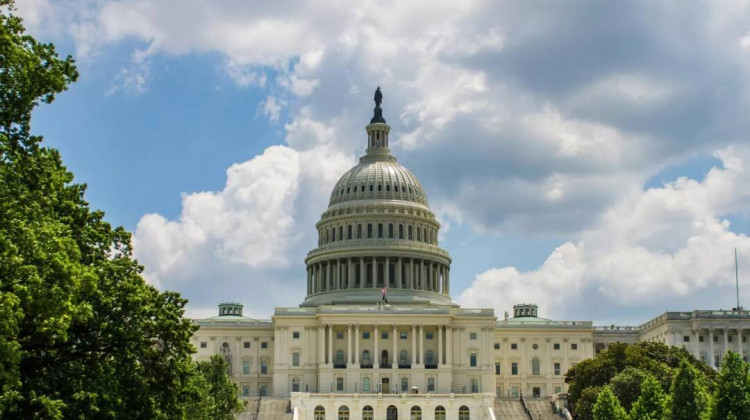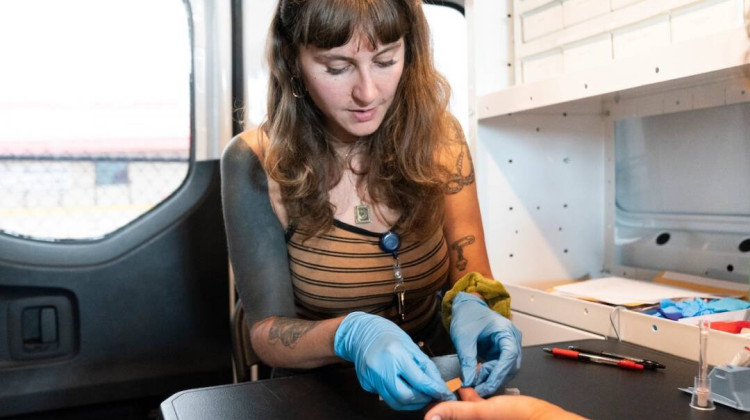
More than a dozen states are seeking federal permission to add work requirements to their Medicaid programs, including Indiana. State lawmakers passed a bill this month directing the state to ask the Trump administration for the OK to add work requirements. Three states — Arkansas, Ohio and Arizona — have submitted official proposals. But can the GOP avoid past mistakes?
Thuan Vo / PexelsA House budget proposal released in February would slash up to $880 billion in spending over the next decade from the public health insurance program that 80 million low-income Americans rely on — including children, seniors and people with disabilities.
Last week, moderate House Republicans joined several GOP senators and governors in publicly opposing deep Medicaid cuts.
But nearly all Republican elected officials seem to agree on one big policy change: Start requiring most adults enrolled in Medicaid to work.
"It's common sense," said House Speaker Mike Johnson earlier this year. "You find dignity in work, and the people that are not doing that, we're going to try to get their attention."
A 2023 analysis from the Congressional Budget Office estimated that a national Medicaid work requirement would save the federal government $100 billion over 10 years. It also found that 1.5 million people would be kicked off the program. Recent evidence suggests that adding such a requirement can have devastating, unintended health consequences.
During the first Trump administration, 22 states sought federal approval to make some kind of work activity a requirement for Medicaid coverage. Just one — Arkansas — fully implemented the policy. (Georgia launched a work requirement in 2023 after a prolonged court battle with the Biden administration.)
More than 18,000 people in Arkansas lost their coverage before a federal court struck down the experiment as incompatible with Medicaid's goals.
Many Medicaid experts across the political spectrum see Arkansas' experience as a cautionary tale. With members of Congress and state leaders revisiting work requirements, some policymakers are turning to Arkansas for lessons to make the policy work better.
Arkansas Medicaid work requirements were burdensome, plagued by confusion
Starting in June 2018, some 60,000 Arkansans on Medicaid had to prove that they had volunteered or worked for 80 hours each month. The policy applied to beneficiaries between ages 30 and 49 who had received coverage through the Affordable Care Act's expansion of Medicaid. Exceptions were made for individuals enrolled in drug treatment, people with disabilities or parents with young children.
"This is not about punishing anyone," insisted then-Arkansas Gov. Asa Hutchinson at a press conference announcing the policy. "It's about giving people an opportunity to work. It's to give them the training that they need. It's to help them move out of poverty and up the economic ladder. That's the objective of it."
State health officials fired off more than 900,000 letters and emails informing Medicaid recipients of the new policy. They contracted with call centers. TV and radio ads blasted public service announcements. And yet, multiple studies and focus groups found that many residents remained confused or oblivious to the work requirement changes.
Adrian McGonigal, who held down a full-time job at a chicken processing plant, dutifully reported his hours to Medicaid officers when the program went live in June 2018. About three months later, a pharmacist told a shocked McGonigal that the state had shut off his Medicaid. He'd have to pay to refill his prescription for COPD, a serious lung condition, on his own.
"It was something like $800 out of pocket for his breathing treatments," said Trevor Hawkins, an attorney at Legal Aid of Arkansas who appealed to the state to get McGonigal's Medicaid reinstated.
Frantic, McGonigal raced to a few other drug stores who all confirmed that he'd lost his coverage.
It got harder for McGonigal to breathe. One worried pharmacist suggested he go to the emergency room and call Hawkins.
"[He said], 'I need help. I'm on the way to the emergency room, and I need my Medicaid,' " Hawkins remembers.
McGonigal later learned he'd lost his coverage because the state required him to log his work hours every month. McGonigal thought he only needed to do it once.
"He thought he was good. And then he wasn't," said Hawkins.
An experiment falls short
Arkansas restored McGonigal's Medicaid coverage in January 2019. Going without his medications, however, took a toll on the 40-year old's life. McGonigal's breathing deteriorated.
Often sick, he lost his job at the chicken plant. His failing health made it impossible to keep the part-time work he landed at a few fast food restaurants. He eventually signed up for disability with the help of Hawkins, who had stayed in touch with McGonigal.
"The work requirements are the clear point that sent his life on a downward spiral that he never recovered from," Hawkins said.
With Republicans' sweep in the 2024 elections, work requirements had regained some of their shine in Washington. Hawkins reached out to McGonigal, but his number was disconnected. An acquaintance sent the lawyer an obituary a few weeks later. McGonigal had died of a heart attack a few days before Thanksgiving in 2024. He was 46 years old.
McGonigal is one of 18,164 people who lost Medicaid coverage for failing to meet Arkansas' work requirements — about one-third of the people who were subject to those rules. Multiple peer-reviewed evaluations suggest most of those who lost coverage were still eligible for it.
Those studies also found no evidence that the work requirement led to more people getting jobs, the program's original goal. Instead, researchers found, people were more likely to become uninsured.
Arkansas' results are unsurprising to Harvard economist Ben Sommers, who led one of the evaluations. Sommers notes that 64% of adults on Medicaid nationwide already work, with another 28% who are either disabled, attend school or care for a family member. That leaves only 8% who, in theory, could work but are not.
"The best case scenario [for work requirements] is a complicated process to nudge a very small number of beneficiaries into work," Sommers said. "The worst case — and much more likely scenario — is a whole lot of people get caught in this red tape, and we spend a lot of money to basically build an administrative system that keeps people out of Medicaid."
New proposals include more job-finding support and less paperwork
More than a dozen states are seeking federal permission to add work requirements to their Medicaid programs, including Indiana. State lawmakers passed a bill this month directing the state to ask the Trump administration for the OK to add work requirements. Three states — Arkansas, Ohio and Arizona — have submitted official proposals, and Georgia is asking the administration to let the state tweak its active work requirement after confronting challenges similar to those in Arkansas.
These new proposals suggest that state policymakers are trying to learn from Arkansas' experience.
Ohio, Georgia and Arkansas have all removed the monthly reporting requirements that cost McGonigal his coverage. State plans call to use existing data such as income tax records and medical status to determine whether someone meets the requirements. The purpose is to create less paperwork for beneficiaries.
States also say they are committed to helping people on Medicaid find jobs and keep their coverage.
Ohio Medicaid Director Maureen Corcoran said her agency will work with the state's Department of Jobs and Family Services to navigate common barriers to work such as lack of transportation and child care.
"We have to acknowledge the complexities that people will be dealing with, and we have a responsibility to help overcome those and to help connect people," Corcoran said.
Arkansans who struggle to find work, get job training, or identify some other related activity like serving as a caretaker in the home, would be matched with a state-funded "success coach." The coach would act as a sort of caseworker who would help the person connect with resources and job opportunities.
"This is fundamentally different than what I think a lot of the rhetoric around work requirements is typically talking about," said Harvard's Sommers. "Rather than, 'do these things or else we take your coverage,' this is, 'do these things, and if not, we're going to work with you to try to improve things for you.'"
Making sure more beneficiaries are aware of work requirements is another lesson learned from Arkansas.
"It's just hard to reach people," said Ray Hanley, a former Arkansas Medicaid director who helped the state with its initial outreach in 2018. "This is a very mobile population. They don't like to answer a phone number they don't recognize."
Arkansas and Ohio have pledged to lean on trusted leaders, says Ohio's Corcoran. She said that includes community organizations and medical providers for "both getting messages out and also input about how to do this in the best way, the most humane way, that provides the best education and support to people."
Sommers said these changes could reduce coverage losses, but each state's execution will play a decisive role. For instance, some states have weak data systems which will likely leave people with a fair amount of paperwork.
Even as states make improvements, any national work requirement creates concerns
Medicaid leaders in many Republican states feel optimistic that they are learning from Arkansas' missteps and creating a more effective work requirement that will actually help lift people out of poverty.
Some of those same leaders worry that Congress will push for a national work requirement that duplicates many of the policy's previous failures. A House bill introduced in February makes no mention of helping people find jobs, limiting paperwork burdens, or ensuring effective outreach.
Barbara Sears Roshon, who served as a Republican state legislator and then Medicaid director in Ohio in the 2010s, is concerned Congress is too focused on making spending cuts.
"For the feds to say, 'you shall have a work requirement and it shall look like that,' I think that takes away from the fact that states are intensely different," she said. "A very rural state is not going to have anywhere near the same number of opportunities or issues or concerns that a very, very urban state is going to have."
Work requirements are one of several ways Congress could reduce Medicaid spending. Other options floated by Republicans involve reducing how much the federal government chips in to help states to cover people on Medicaid. Congress could set a cap on how much it gives states for each person on Medicaid, give states a lump sum for their entire Medicaid programs, or cut how much the federal government pays for people covered under the ACA expansion.
The Congressional Budget Office estimates any of these options would cut federal spending by at least $500 billion over the next decade and cause states to reduce enrollment and services provided to patients.
Work requirements seem to have emerged as a consensus option because they would not directly reduce federal support that states rely on to fund their Medicaid programs. It's also seen as more politically palatable because a majority of Americans support the policy.
Work requirements produce savings by reducing the number of people who qualify for Medicaid. A recent study out of the Urban Institute estimates that a national work requirement could cause as many as 5 million people to lose their coverage.
Angela Rachidi, a senior fellow in poverty studies at the American Enterprise Institute, said she believes evidence from other welfare programs — like cash and food assistance — supports work requirements. But, given the limited evidence in Medicaid, Congress should start small, she said, if the goal is to help people get better jobs.
"You'd want to do it in a small pilot-based way," she said, "in order to develop evidence and then use that evidence to either scale up or to discontinue programs."
Ryan Levi is a reporter and producer for Tradeoffs, a nonprofit news organization that reports on health care's toughest choices and an editorial partner of Side Effects Public Media. You can sign up for Tradeoffs' weekly newsletter to get the latest stories in your inbox each Thursday morning.
Tradeoffs reporting for this story was supported, in part, by Arnold Ventures.
Side Effects Public Media is a health reporting collaboration based at WFYI in Indianapolis. We partner with NPR stations across the Midwest and surrounding areas — including KBIA and KCUR in Missouri, Iowa Public Radio, Ideastream in Ohio and WFPL in Kentucky.
 DONATE
DONATE






 Support WFYI. We can't do it without you.
Support WFYI. We can't do it without you.